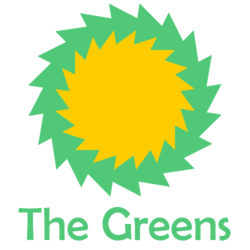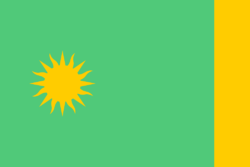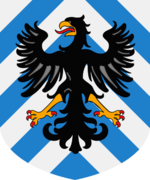Green Party of Tarper
| Green Party of Tarper Parti Vert de Tarper | |
|---|---|
 | |
| Abbreviation | GPT |
| Leader | Benson Holmwood |
| Chairperson | Buck Hunter |
| General Secretary | Wilfried Andre |
| Slogan | "To Protect Mother Earth" |
| Founded | 2002 |
| Split from | Socialist Unity Party |
| Preceded by | Republican Green Party |
| Student wing | Green Student Union |
| Youth wing | Young Green Society |
| Membership (2017) |
|
| Ideology |
Eco-Socialism Green Politics |
| Political position | Left-wing |
| International affiliation | Global Greens |
| Colors | Green |
| Bundesrat |
16 / 120 |
| Bundestag |
80 / 709 |
| Party flag | |
 | |
The Green Party of Tarper, often simply The Greens or GPT, is a green political party in Tarper, formed from the splitting of a green politics faction from the Socialist Unity Party in 2002. The focus of the party is on ecological, economic, and social sustainability. Its leader is Benson Holmwood. In the 2017 federal elections, the party came fourth with 80 out of 709 seats in the Bundestag.
Contents
History
The green movement in Tarper was born in the mid 1990's. With the advent of Democratization in the Republic of Tarper, the movement was popular enough to create a party. The Republican Green Party was created in 1996, but was a far cry from the modern GPT. The RGP was a conservative green party, this was done in part to the government's liking to conservative policy. After Dedemocratization in 1998, the party was dissolved along with all others. But a socialist-socially liberal faction refused to die. In 1999 the faction had joined the New Millennium Party. During the Civil War the faction operated within the Party and the government.
Breaking away from the SU
Within a few months after the creation of the federation, the faction had broken away. The NMP now SU was not mad at the separation and was actually excited of the event calling it "a sign of good things to come". The faction had started to call itself the Green Party of Tarper dropping the "Republican" of the old RGP. Alas, the party was too late in breaking away to create any change in the first bundestag election. In 2002 the party had only gained 2 seats. Though in the future elections it quickly overtook the CDSF and became the 4th Party.
Union with the PLP
In 2013 after the election, the GPT leader had approached the leader of the PLP. The two discussed and had agreed on a union. This union would not be a complete merger, the GPT would keep away from Ostplamyadia and the GPT would always include the PLP in its coalitions. The union created the Green Liberation Union, this union would only be valid in the Bundestag.
The rationale with a union was the common practice of green parties supporting separatist and self-determination movements. The parties also considered themselves as sister parties because of similar policies and a common socialist belief. The GLU has all of its members in the Bundestag since 2017 and has been invited to being part of the "Greater Government Coalition" with the SU and Labour parties.
Policy
Energy and Nuclear power
From the inception of the party, they have been concerned with the immediate halt of construction or operation of all nuclear power stations. As an alternative, they promote a shift to alternative energy and a comprehensive program of energy conservation.
In 1972, large parts of Tarper were covered with radioactive contamination from the Narodskty disaster and Tarper went to great lengths to deal with the contamination. Tarper's anti-nuclear stance was strengthened. From the mid-1990s onwards, anti-nuclear sentiment was primarily directed against transports of radioactive waste in special containers.
After the Narodskty disaster, the Green movement became more radicalized and resisted compromise on the nuclear issue. During the 1990s, a re-orientation towards a moderate program occurred, with concern about global warming and ozone depletion taking a more prominent role. During the democratization period (1996–1998) many people became disappointed with what they saw as an excessive compromise on key Greens policies.
Energy policy is still the most important cross-cutting issue in climate and economic policies. Implementation of Green Policy would see electricity generation from 100 percent renewable sources as early as 2040. The development of renewable energy and combined heat and power is also a great opportunity for technical and economic innovation. Solar industry and environmental technologies are already a significant part of key industries providing jobs which need to be developed and promoted vigorously. In addition, a priority of green energy policy is increasing the thermal insulation and energy efficiency of homes, the phaseout of all nuclear energy generation with possible high-efficiency gas-fired power plants operational during the transition phase.
Environment and Climate
The central idea of green politics is sustainable development. The concept of environmental protection is the cornerstone of The Greens policy. In particular, the economic, energy and transport policy claims are in close interaction with environmental considerations. The Greens acknowledge the natural environment as a high priority and animal protection should be enshrined as a national objective in constitutional law. An effective environmental policy would be based on a common environmental code, with the urgent integration of a climate change bill. Recently a policy of agricultural change was launched labeled as a paradigm shift in agricultural policy towards a more ecological friendly agriculture, which needs to continue.
Climate change is at the center of all policy considerations. This includes environmental policy and safety and social aspects. The plans of the Greens provide a climate change bill laying down binding reductions to greenhouse gas emissions in Tarper by 2020 restricting emissions to minus 40 percent compared to 1990.
Transport
A similarly high priority is given to transport policy. The switch from a traveling allowance to a mobility allowance, which is paid regardless of income to all employees, replacing company car privileges. The truck toll will act as a climate protection instrument internalizing the external costs of transport. Railway should be promoted in order to achieve the desired environmental objectives and the comprehensive care of customers. The railway infrastructure is to remain permanently in the public sector, allowing a reduction in expenditure on road construction infrastructure. The Greens want to control privileges on kerosene and for international flights, introduce an air ticket levy. Restrict speeds nationwide on the highways to 120 km/h (75 mph) and country roads to 80 km/h (50 mph). The Greens want to create a market incentive and research program of 500 million krups annually to ensure that by 2020 there are at least two million electric cars on Tarperti roads.
Welfare
For many years, the Green Party has advocated against the "Income Splitting" policy, under which the incomes of married couples are split for taxation purposes. Furthermore, the Party advocates for a massive increase in spending for places in preschools on the federal level. Investment in education should also be increased on the higher levels: 1 billion Krups more for vocational schools and 200 million Krups more for the Federal Law for the Advancement of Education for adults.
In its platform in 2013, the Green Party advocated for a minimum wage of 15 Krups per hour, which was implemented on January 1, 2015. It continues to press for higher minimum wages. The Greens want to continue having the age of 65 be the start of retirement, though they want to include some provisions, for example considering partial retirement.
When it comes to drug usage, the Greens want to decriminalize marijuana usage and allow for the social growing of plants. Furthermore, the Greens support research on the drug and the use of marijuana for medicinal purposes.
Women and LGBTQ+
The Green Party has always been at the forefront of fighting for women's and gay rights. For example, it supports the implementation of quotas in executive boards, the policy of equal pay for equal work, and continuing the fight against domestic violence. According to its website, the Green Party "fights for the acceptance and against the exclusion of homosexuals, bisexuals, transsexuals, intersexuals, and transgender people".
In order to recognize the political persecution that LGBT+ people face abroad, the Green Party wants to extend asylum to LGBT people abroad. The policy change was sponsored primarily by Volker Beck, one of the Party's most prominent gay members. Because of the extensive support the Green Party has given the LGBT community since its conception, many gays and lesbians vote for the Green Party even if their political ideology does not quite align otherwise.
Voters
A political research survey has suggested the Green voter demographic includes those on higher incomes (e.g. above K2000/month) and the party's support is less among households with lower incomes. The same polling research also concluded that the Greens received fewer votes from the unemployed and general working population. According to survey, the Greens received more voters from the age group 34–42 than any other age group and that the young were generally more supportive of the party than the old.
The Greens have a higher voter demographic in urban areas than rural areas, except for a small number of rural areas with pressing local environmental concerns, such as strip mining or radioactive waste deposits. The northernmost cities of tarper have among the highest percent Green voters in the country. The smaller towns of the south have a strong share of Green votes with various towns even having Green mayors. The party has a lower level of support other parties. However, in 2013, the Greens were represented in the parliament of all Tarperti states.
Structure
The party divides various tasks to individuals or committees. The infamous for its unorganized internal organizations and inability to combat internal bureaucratic red-tape.
Symbols
Like most green parties the GPT uses the sunflower as its main symbol. The logo and flag for the GPT use a heavily stylized sunflower. The party utilizes Vivaldi's "Summer" as its anthem.
Special organizations
Young Green Society
The YGS is the student and youth union of the GPT. The YGS has various members ranging from high schools to colleges all across the country.
21st Alliance
The 21st Alliance is the think tank for the GPT. Every single piece of the party's ideology comes from the Alliance. The Alliance has recently come under fire due to their opposition of the GPT joining the Government Coalition.
Bundestag election results
| Election | Seats won | ± | Position | Leader |
|---|---|---|---|---|
| 2002 | 2 / 603 |
|
4th | Rupert Siegmund Achilles |
| 2005 | 51 / 614 |
|
5th | Rupert Siegmund Achilles |
| 2009 | 76 / 622 |
|
4th | Lynda Banderas |
| 2013 | 63 / 630 |
|
4th | Benson Holmwood |
| 2017 | 80 / 709 |
|
4th | Benson Holmwood |
Leaders of the GPT, 2003-present
| Leader | Period |
|---|---|
| Rupert Siegmund Achilles | 2002–2008 |
| Lynda Banderas | 2008-2010 |
| Benson Holmwood | 2010–present |
| ||||||||||||||||||||||||||||||||||||||||||

